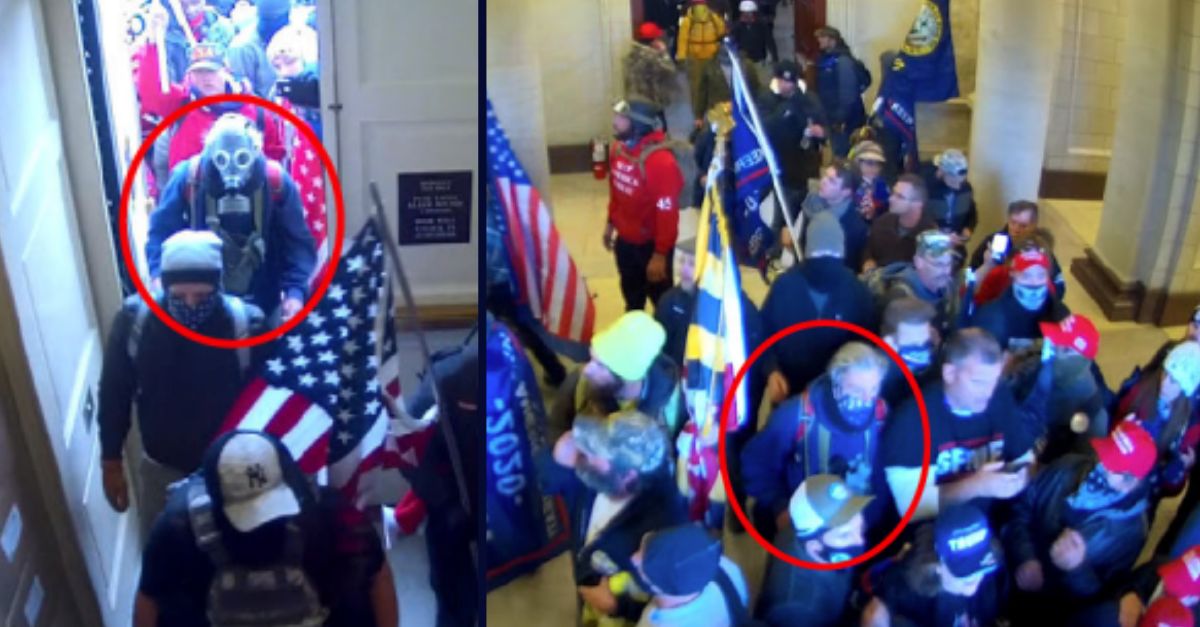
Daniel Edwin Wilson is seen in the U.S. Capitol on Jan. 6, 2021 (U.S. Attorney’s Office).
After initially saying a pardoned Jan. 6 rioter was erroneously released from custody for firearms possession charges stemming from a raid at his home in the insurrection case, federal prosecutors argued this week the man should remain free after they say President Donald Trump’s mass pardon covers the weapons offenses.
In court documents, prosecutors asked U.S. District Judge Dabney Friedrich, a Trump appointee, to drop weapons charges against Daniel Edwin Wilson, 49. He was arrested in the Jan. 6 case on May 25, 2023, and he ultimately pleaded guilty to conspiracy to impede or injure a federal officer, possession of a firearm by a prohibited person and possession of an unregistered firearm. He was sentenced on Aug. 28, 2024, to 60 months — or five years — in prison.
Nearly five months later, he was one of 1,500 convicted Jan. 6 rioters freed from custody under President Trump’s Inauguration Day pardon.
But after prosecutors said he was erroneously released from custody, he was ordered to self-surrender to serve out his term for the separate weapons charges. His attorney filed a motion to stay that order, and the court ordered the government to clarify whether the pardon covered the defendant’s firearm convictions.
“In the intervening period since the government filed its response, the government has received further clarity on the intent of the pardon,” prosecutors wrote in Tuesday’s filing. “Under these circumstances, the Presidential Pardon includes a pardon for the firearm convictions to which the defendant pled, similar to other defendants in which the government has made comparable motions.”
On Jan. 6, Wilson watched Trump’s speech near the White House — in which Trump encouraged his supporters to “fight like hell” against congressional certification of Joe Biden’s 2020 electoral win — before walking to the Capitol building. On his way, prosecutors said, he passed fencing and barricades — clear indications that he and other rioters were not supposed to be there — and joined thousands of Trump supporters on Capitol grounds.
Prosecutors said Wilson began planning in the winter of 2020 to obstruct and interfere with the joint session of Congress set to take place that day.
“Ooh Rah. Curb stomp crew all in!!!” Wilson, who went by the moniker “Live Wire,” responded to a discussion group about traveling to Washington, D.C., on Jan. 6.
Later, he wrote, “We are willing to work and coordinate with others, but I am a gray ghost ranger,” referring to Wilson’s affiliation with a particular militia.
In another post on Christmas Eve 2020 he wrote, “In my opinion I don’t think it’s time to gun up for the sixth we have to play this out but if they seat biden on the 20th all bets are off it’s gonna happen even if Trump wins we have to get this government under control it’s been crossing my mind if we go to a Civil War do we try to take Washington DC first or do we try to take state capitals first.”
Days later, Wilson wrote, “I am ready to lay my life on the line. It is time for good men to do bad things.”
He was also in contact with other rioters as the breach of the Capitol was underway on Jan. 6, prosecutors say.
At one point over Zello, he received a message from someone asking, “How many patriots do we have pushing through at the Capitol, Live Wire?”
“Hey, pass the word, Badlands, as fast as you can, the people are pushing on the Capitol. We need hands on deck,” Wilson responded a few seconds later.
“Heard, Live Wire. Will send,” was the response.
Wilson used Zello again at approximately 1:45 p.m. and shared a message to a group called “Oath Keepers general chat.” In that message, Wilson said, “Hey, whoever’s got ears on, even if you ain’t in D.C., pass the word, the people are pushing on the Capitol. We need all hands on deck.”
Wearing a gas mask, he ultimately went inside the Capitol and stayed there for 12 minutes, prosecutors say.
The investigation into Wilson yielded evidence of additional crimes: on June 3, 2022, law enforcement seized six firearms from Wilson’s home, according to the statement of offense. He was prohibited from possessing firearms at the time due to previous felony convictions that included burglary and theft dating back to 1994, the document said.
In at least one other case, prosecutors have fought to keep separate weapons-related charges against a pardoned Jan. 6 rioter. In that case, Taylor Taranto — who was charged with disorderly conduct and trespassing misdemeanors related to the Capitol attack — is accused of showing up at Barack Obama’s home in Washington, D.C., in 2023, toting guns, ammunition and supplies for an explosive device. Earlier this month, prosecutors argued that the weapons charges are “wholly unrelated” to Trump’s Jan. 6 pardon and shouldn’t be dismissed.
In another case, however, prosecutors have said Trump’s Jan. 6 pardons don’t cover a Capitol rioter’s conviction for plotting to kill the FBI agents who investigated him for his pardoned Capitol attack crimes.
Marisa Sarnoff contributed to this report.





